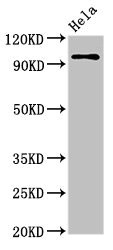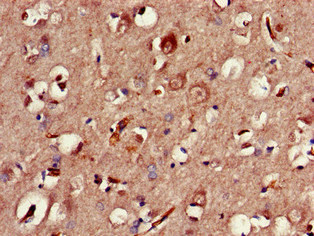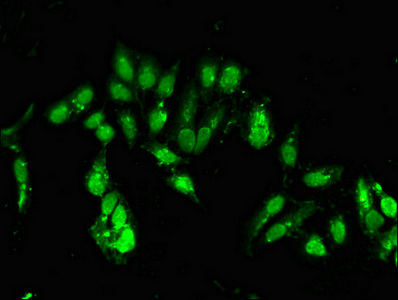CLOCK Antibody
-
货号:CSB-PA005574EA01HU
-
规格:¥440
-
促销:
-
图片:
-
Western Blot
Positive WB detected in: Hela whole cell lysate
All lanes: CLOCK antibody at 3.5μg/ml
Secondary
Goat polyclonal to rabbit IgG at 1/50000 dilution
Predicted band size: 96 kDa
Observed band size: 96 kDa -
Immunohistochemistry of paraffin-embedded human brain tissue using CSB-PA005574EA01HU at dilution of 1:100
-
Immunofluorescent analysis of Hela cells using CSB-PA005574EA01HU at dilution of 1:100 and Alexa Fluor 488-congugated AffiniPure Goat Anti-Rabbit IgG(H+L)
-
-
其他:
产品详情
-
产品名称:Rabbit anti-Homo sapiens (Human) CLOCK Polyclonal antibody
-
Uniprot No.:O15516
-
基因名:CLOCK
-
别名:bHLHe8 antibody; Circadian locomoter output cycles kaput protein antibody; Circadian locomoter output cycles protein kaput antibody; Circadian Locomotor Output Cycles Kaput antibody; Circadium Locomotor Output Cycles Kaput antibody; Class E basic helix-loop-helix protein 8 antibody; CLOCK antibody; Clock circadian regulator antibody; Clock homolog antibody; Clock protein antibody; CLOCK_HUMAN antibody; hCLOCK antibody; KIAA0334 antibody
-
宿主:Rabbit
-
反应种属:Human
-
免疫原:Recombinant Human Circadian locomoter output cycles protein kaput protein (577-846AA)
-
免疫原种属:Homo sapiens (Human)
-
标记方式:Non-conjugated
本页面中的产品,CLOCK Antibody (CSB-PA005574EA01HU),的标记方式是Non-conjugated。对于CLOCK Antibody,我们还提供其他标记。见下表:
-
克隆类型:Polyclonal
-
抗体亚型:IgG
-
纯化方式:>95%, Protein G purified
-
浓度:It differs from different batches. Please contact us to confirm it.
-
保存缓冲液:Preservative: 0.03% Proclin 300
Constituents: 50% Glycerol, 0.01M PBS, pH 7.4 -
产品提供形式:Liquid
-
应用范围:ELISA, WB, IHC, IF
-
推荐稀释比:
Application Recommended Dilution WB 1:500-1:5000 IHC 1:20-1:200 IF 1:50-1:200 -
Protocols:
-
储存条件:Upon receipt, store at -20°C or -80°C. Avoid repeated freeze.
-
货期:Basically, we can dispatch the products out in 1-3 working days after receiving your orders. Delivery time maybe differs from different purchasing way or location, please kindly consult your local distributors for specific delivery time.
相关产品
靶点详情
-
功能:Transcriptional activator which forms a core component of the circadian clock. The circadian clock, an internal time-keeping system, regulates various physiological processes through the generation of approximately 24 hour circadian rhythms in gene expression, which are translated into rhythms in metabolism and behavior. It is derived from the Latin roots 'circa' (about) and 'diem' (day) and acts as an important regulator of a wide array of physiological functions including metabolism, sleep, body temperature, blood pressure, endocrine, immune, cardiovascular, and renal function. Consists of two major components: the central clock, residing in the suprachiasmatic nucleus (SCN) of the brain, and the peripheral clocks that are present in nearly every tissue and organ system. Both the central and peripheral clocks can be reset by environmental cues, also known as Zeitgebers (German for 'timegivers'). The predominant Zeitgeber for the central clock is light, which is sensed by retina and signals directly to the SCN. The central clock entrains the peripheral clocks through neuronal and hormonal signals, body temperature and feeding-related cues, aligning all clocks with the external light/dark cycle. Circadian rhythms allow an organism to achieve temporal homeostasis with its environment at the molecular level by regulating gene expression to create a peak of protein expression once every 24 hours to control when a particular physiological process is most active with respect to the solar day. Transcription and translation of core clock components (CLOCK, NPAS2, ARNTL/BMAL1, ARNTL2/BMAL2, PER1, PER2, PER3, CRY1 and CRY2) plays a critical role in rhythm generation, whereas delays imposed by post-translational modifications (PTMs) are important for determining the period (tau) of the rhythms (tau refers to the period of a rhythm and is the length, in time, of one complete cycle). A diurnal rhythm is synchronized with the day/night cycle, while the ultradian and infradian rhythms have a period shorter and longer than 24 hours, respectively. Disruptions in the circadian rhythms contribute to the pathology of cardiovascular diseases, cancer, metabolic syndromes and aging. A transcription/translation feedback loop (TTFL) forms the core of the molecular circadian clock mechanism. Transcription factors, CLOCK or NPAS2 and ARNTL/BMAL1 or ARNTL2/BMAL2, form the positive limb of the feedback loop, act in the form of a heterodimer and activate the transcription of core clock genes and clock-controlled genes (involved in key metabolic processes), harboring E-box elements (5'-CACGTG-3') within their promoters. The core clock genes: PER1/2/3 and CRY1/2 which are transcriptional repressors form the negative limb of the feedback loop and interact with the CLOCK|NPAS2-ARNTL/BMAL1|ARNTL2/BMAL2 heterodimer inhibiting its activity and thereby negatively regulating their own expression. This heterodimer also activates nuclear receptors NR1D1/2 and RORA/B/G, which form a second feedback loop and which activate and repress ARNTL/BMAL1 transcription, respectively. Regulates the circadian expression of ICAM1, VCAM1, CCL2, THPO and MPL and also acts as an enhancer of the transactivation potential of NF-kappaB. Plays an important role in the homeostatic regulation of sleep. The CLOCK-ARNTL/BMAL1 heterodimer regulates the circadian expression of SERPINE1/PAI1, VWF, B3, CCRN4L/NOC, NAMPT, DBP, MYOD1, PPARGC1A, PPARGC1B, SIRT1, GYS2, F7, NGFR, GNRHR, BHLHE40/DEC1, ATF4, MTA1, KLF10 and also genes implicated in glucose and lipid metabolism. Promotes rhythmic chromatin opening, regulating the DNA accessibility of other transcription factors. The CLOCK-ARNTL2/BMAL2 heterodimer activates the transcription of SERPINE1/PAI1 and BHLHE40/DEC1. The preferred binding motif for the CLOCK-ARNTL/BMAL1 heterodimer is 5'-CACGTGA-3', which contains a flanking Ala residue in addition to the canonical 6-nucleotide E-box sequence. CLOCK specifically binds to the half-site 5'-CAC-3', while ARNTL binds to the half-site 5'-GTGA-3'. The CLOCK-ARNTL/BMAL1 heterodimer also recognizes the non-canonical E-box motifs 5'-AACGTGA-3' and 5'-CATGTGA-3'. CLOCK has an intrinsic acetyltransferase activity, which enables circadian chromatin remodeling by acetylating histones and nonhistone proteins, including its own partner ARNTL/BMAL1. Represses glucocorticoid receptor NR3C1/GR-induced transcriptional activity by reducing the association of NR3C1/GR to glucocorticoid response elements (GREs) via the acetylation of multiple lysine residues located in its hinge region. The acetyltransferase activity of CLOCK is as important as its transcription activity in circadian control. Acetylates metabolic enzymes IMPDH2 and NDUFA9 in a circadian manner. Facilitated by BMAL1, rhythmically interacts and acetylates argininosuccinate synthase 1 (ASS1) leading to enzymatic inhibition of ASS1 as well as the circadian oscillation of arginine biosynthesis and subsequent ureagenesis. Drives the circadian rhythm of blood pressure through transcriptional activation of ATP1B1.
-
基因功能参考文献:
- As a novel CLOCK-dependent diurnal gene, TIMP3 inhibits the expression of inflammatory cytokines that are up-regulated by UV irradiation in human keratinocytes. PMID: 29180440
- the CLOCK gene polymorphism is one of factors determining elastic properties of vascular wall PMID: 28290876
- Rhythmic luciferase activity from clock gene luciferase reporter cells lines was used to test the effect of p38 MAPK inhibition on clock properties as determined using the damped sine fit and Levenberg-Marquardt algorithm.Glioma treatment with p38 MAPK inhibitors may be more effective and less toxic if administered at the appropriate time of the day. PMID: 29316898
- data suggest that SNP variability in the CLOCK gene for rs6850524 and rs11932595 is associated with idiopathic recurrent spontaneous abortion in pregnancies from Slovenia and Serbia PMID: 29768442
- Results indicated that inhibiting the circadian gene Clock expression can reverse the cisplatin resistance of ovarian cancer SKOV3/DDP cell lines by affecting the protein expression of drug resistance genes during which autophagy plays an important role. PMID: 28514207
- Low expression of CLOCK protein is associated with kidney tumor. PMID: 29271044
- Association between HCRTR2, ADH4,CLOCK gene polymorphisms and cluster headache was not significant in the present study. PMID: 29318394
- No association between 3111T/C Clock gene polymorphism and complaints of patients with insomnia was detected. PMID: 28853078
- Study found three gene variants (CLOCK-rs4864548, PEMT-rs936108, and GHRELIN-rs696217) that exhibited uncorrected gene-by-sleep duration interactions in relation to BMI z-scores in a cohort of New Zealand European children. However, no interactions were identified in percentage body fat differences. Notably, these interactions are evident without detectable effects on sleep duration. PMID: 28899534
- These findings suggest that upregulation of the circadian gene hClock plays an important role in metastasis of colorectal cancer. PMID: 28498393
- results of this study suggest that genetic variability in the ARNTL and CLOCK genes might be associated with risk for multiple sclerosis PMID: 29324865
- Evening chronotype is associated with higher obesity in severely obese subjects and with lower weight loss effectiveness after bariatric surgery. In addition, circadian preferences interact with CLOCK 3111T/C for obesity. The circadian and genetic assessment could provide tailored weight loss recommendations in subjects who underwent bariatric surgery. PMID: 27339606
- CLOCK regulates the expression of genes involved in neuronal migration, and a functional assay showed that CLOCK knockdown increased neuronal migratory distance. PMID: 29196536
- Our findings suggest that CLOCK and CRY1 polymorphisms might be involved in individual susceptibility to abdominal obesity in Chinese Han population. PMID: 26923944
- Our results suggest that the circadian gene human Clock may play an important role in carcinogenesis by inhibiting apoptotic cell death via attenuating proapoptotic signaling PMID: 25976934
- ASS1 acetylation by CLOCK exhibits circadian oscillation in human cells and mouse liver, possibly caused by rhythmic interaction between CLOCK and ASS1, leading to the circadian regulation of ASS1 and ureagenesis. PMID: 28985504
- CLOCK SNP rs2070062 is associated with shorter sleep duration. PMID: 28645331
- This study showed that Lack of Association between Genetic Polymorphism of clock gene with Late Onset Depression and Alzheimer's Disease in a Sample of a Brazilian Population This study showed that Lack of Association between Genetic Polymorphism of PER2 gene with Late Onset Depression and Alzheimer's Disease in a Sample of a Brazilian Population PMID: 27335043
- CLOCK gene expression mean was significantly higher in morning than in evening during Shabaan PMID: 28384165
- found that overexpression of both Clock and Bmal1 suppressed cell growth PMID: 26370682
- Clock circadian regulator (CLOCK) gene single nucleotide polymorphism rs1801260 minor allele C showed a significantly higher association with the prevalence of diabetes in the Japanese population independent of body mass index (BMI). PMID: 26374515
- a novel mechanism of action of CLOCK in human umbilical vein endothelial cells, is reported. PMID: 28058089
- Low Clock gene expression is associated with colorectal liver metastases. PMID: 27492458
- The possession of CLOCK rs3749474 may influence the effect of reducing the percentage intake of dietary fat on obesity-associated variables and carrying this SNP might benefit more than others from weight loss treatment involving dietary fat restriction. PMID: 26690565
- CLOCK gene variation is associated with incidence of type-2 diabetes and cardiovascular diseases in type-2 diabetic subjects. Suggest diet-gene interaction. PMID: 26739996
- Clock gene variants associated with obesity and sleep duration. [review] PMID: 26553137
- CLOCK rs1801260 modulated the relationship between early stress, adult history of attempted suicide and current suicide ideation PMID: 26204460
- The CLOCK 3111T > C polymorphism could be an independent risk factor for irregular menstrual cycles, irrespective of psychological distress and endocrine or metabolic conditions in Korean adolescents. PMID: 26453284
- Findings indicate that CLOCK protein plays an important role in fertility and its knockdown leads to reduction in reproduction and increased miscarriage risk. PMID: 26390085
- when overexpressed, c-MYC is able to repress Per1 transactivation by BMAL1/CLOCK via targeting selective E-box sequences. Importantly, upon serum stimulation, MYC was detected in BMAL1 protein complexes PMID: 26850841
- Variants of the CLOCK gene are associated with idiopathic male infertility and therefore may be applied as a risk factor of male infertility. PMID: 26181468
- CLOCK, ARNTL, and NPAS2 gene polymorphisms may have a role in seasonal variations in mood and behavior PMID: 26134245
- minor polymorphisms of CLOCK may be associated with poor morning gastric motility, and may have a combinatorial effect with PER3. PMID: 25775462
- CLOCK 3111 T/C SNP interacts with emotional eating behavior to modulate total weight loss. PMID: 24905098
- these findings suggest that sumoylation plays a critical role in the spatiotemporal co-activation of CLOCK-BMAL1 by CBP for immediate-early Per induction and the resetting of the circadian clock. PMID: 26164627
- the circadian gene hClock promoted CRC progression and inhibit tumor cell apoptosis in vitro and in vivo, while silencing hClock was able to reverse this effect. PMID: 25625359
- PASD1 is a circadian bHLH-PAS paralog repressor of CLOCK protein expression. PMID: 25936801
- The observed interaction effects provide converging evidence that the clock gene and OXT/AVP systems are intertwined and contribute to human prosociality. PMID: 25309987
- There is not a significant difference in the expression of CLOCK, BMAL1, and PER1 in buccal epithelial cells of patients with essential arterial hypertension regardless of patient genotype. PMID: 25070164
- The CLOCK 3111T/C polymorphism was not significantly associated with overweight or sleep duration. PMID: 24818524
- CLOCK polymorphisms are associated with increased susceptibility of schizophrenic patients to restless legs syndrome PMID: 24824748
- The results of this study present no evidence for an association of CLOCK polymorphisms with juvenile myoclonic epilepsy. PMID: 24892753
- Data suggest that influence of obesity-associated CLOCK SNPs (rs12649507, rs6858749) on sleep duration and macronutrient intake can be ameliorated via habitual longer sleep duration and favorable dietary profile (lower protein; higher PUFA). PMID: 25527757
- Two single nucleotide polymorphisms in RORA were associated with breast cancer in the whole sample and among postmenopausal women, and we also reported an association with CLOCK, RORA, and NPAS2 in the analyses at the gene level PMID: 24919398
- A population specific variation of MTHFR and hCLOCK genes also highlights ethnicity specific risk management. PMID: 24510388
- SNP (rs6855837) in the CLOCK gene is significant correlation with genotype and allele frequency in lung cancer. PMID: 24821610
- E2 promoted the binding of ERalpha to the EREs (estrogen-response elements) of CLOCK promoter, thereby up-regulating the transcription of CLOCK PMID: 24789043
- data support the notion that a chronic consumption of a healthy diet may play a contributing role in triggering glucose metabolism by interacting with the rs1801260 SNP at CLOCK gene locus in metabolic syndrome patients PMID: 24328727
- No association with SNPs or haplotypes of the CLOCK gene was observed in prophylactic lithium response. PMID: 24636202
- This study failed to show a mediating role of evening preference, ongoing efforts are needed to identify the mechanisms by which the CLOCK gene determines ADHD-related traits. PMID: 24068320
显示更多
收起更多
-
亚细胞定位:Nucleus. Cytoplasm. Cytoplasm, cytosol.
-
组织特异性:Hair follicles (at protein level). Expressed in all tissues examined including spleen, thymus, prostate, testis, ovary, small intestine, colon, leukocytes, heart, brain, placenta, lung, liver, skeletal muscle, kidney and pancreas. Highest levels in testis
-
数据库链接:
HGNC: 2082
OMIM: 601851
KEGG: hsa:9575
STRING: 9606.ENSP00000308741
UniGene: Hs.436975
Most popular with customers
-
-
YWHAB Recombinant Monoclonal Antibody
Applications: ELISA, WB, IF, FC
Species Reactivity: Human, Mouse, Rat
-
Phospho-YAP1 (S127) Recombinant Monoclonal Antibody
Applications: ELISA, WB, IHC
Species Reactivity: Human
-
-
-
-
-
























